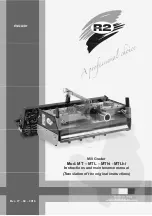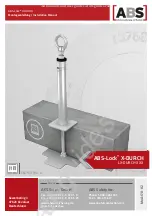
NI 5922 Calibration Procedure
|
© National Instruments
|
3
Calibration functions are C function calls or LabVIEW VIs in NI-SCOPE. In this document, the
C function call is shown first, followed by the corresponding LabVIEW VI in parentheses. The
C function calls are valid for any compiler capable of calling a 32-bit DLL. Many of the
functions use constants defined in the
niScopeCal.h
file. To use these constants in C, you
must include
niScopeCal.h
in your code when you write the calibration procedure.
For more information on the calibration functions and VIs, refer to the
NI-SCOPE Function
Reference Help
or the
NI-SCOPE VI Reference Help
. These references can be found in the
NI High-Speed Digitizers Help
. To access this help file, go to
Start»Programs»National
Instruments» NI-SCOPE»Documentation»NI High-Speed Digitizers Help
.
Table 1.
Calibration File Locations after Installing NI-SCOPE 2.8 or Later
File Name and Location
Description
IVI\Bin\niscope_32.dll
NI-SCOPE driver containing the entire
NI-SCOPE API, including calibration
functions
IVI\Lib\msc\niscope.lib
NI-SCOPE library for Microsoft C
containing the entire NI-SCOPE API,
including calibration functions
LabVIEW
(
version
)\examples\instr\
niScope
Directory of LabVIEW NI-SCOPE example
VIs, including self-calibration; access the
calibration example from the LabVIEW
function palette
LabVIEW
(
version
)\instr.lib\niScope
Calibrate\niScopeCal.llb
LabVIEW VI library containing VIs for
calling the NI-SCOPE calibration API;
access calibration functions from the
NI-SCOPE calibration section of the
LabVIEW function palette
IVI\Drivers\niScope\
niScopeCal.fp
CVI function panel file that includes
external calibration function prototypes and
help on using NI-SCOPE in the CVI
environment
IVI\Include\niScopeCal.h
Calibration header file, which you must
include in any C program accessing
calibration functions. This file automatically
includes
niScope.h
, which defines the rest
of the NI-SCOPE interface
IVI\Drivers\niScope\Examples
Directory of NI-SCOPE examples for CVI,
C, Visual C++, and Visual Basic




































